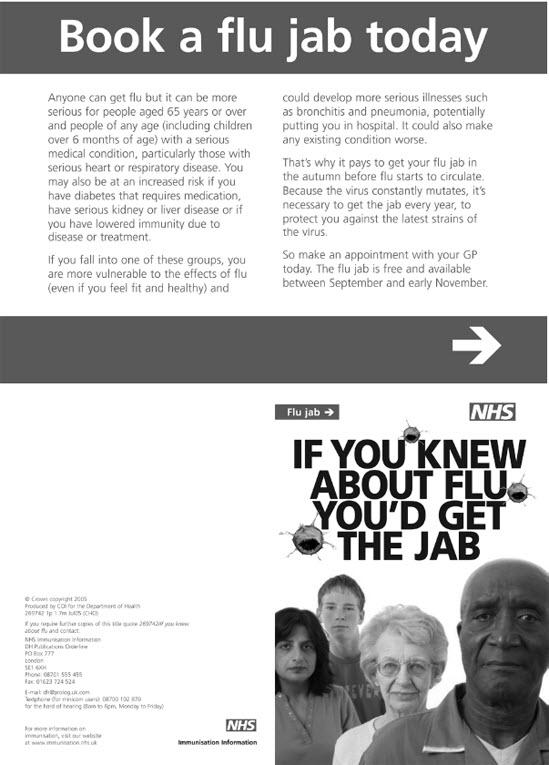Promotion of Health Behaviors

in HEALTH PROMOTION AND INTERVENTION
from Key Concepts in Health Psychology
MEANING
Health psychology is concerned with how psychological processes are important for understanding how we maximize longevity and facilitate quality of life. Health promotion builds on this assumption and concerns 'any event, process or activity that facilitates the protection or improvement of the health status of individuals, groups, communities or population' (Marks et al., 2005: 393). With such an overarching definition, health promotion is about all interventions, environmentally based or behaviourally based, that seek to address and allow for changes in individual and population health status. Some of these interventions will be based on matching the intervention to the individual or group (see for example intervention-based stages/phases of change in Chapter 3) while others will be focused on intervening with the masses, such as large-scale health education programmes.
ORIGINS
At some point in our lives we have all been the recipient of some form of health promotion activity whether it be through being exposed to health promotion leaflets in general practitioner's surgeries or viewing the large-scale messages developed for television, radio or billboards. We have been exposed to health education or promotion at all points in our lives. Figure 10.1 gives a few examples of health promotion activity.
Health promotion is as old as the discipline of health psychology. Indeed the idea that there is some mileage in designing interventions to facilitate cognitive and behavioural change in individuals and groups of individuals so as not to experience negative (health) outcomes is probably as old as psychology itself. Nevertheless, the development of various models for understanding how and why people take the health-related decisions they do (e.g. the health belief model – Chapter 3), and whether by knowing this we can design interventions to encourage people and groups to form decisions and behave in a less health-compromising manner, have been central for the operation and development of health psychology as a discipline.
CURRENT USAGE
Health promotion concerns environmentally based interventions as well as those focused on the behaviour of individuals, groups or even populations. Environmentally based interventions encompass public policies developed by significant health-related organizations (e.g. the World Health Organization) and are applied within individual countries (Bennett and Murphy, 1997) such as the focus on creating a healthy environment (in schools, workplaces and neighbourhoods) adopted by the UK government's Our Healthier Nation programme

Examples of health promotion leaflets


(Department of Health, 1998). On the whole, how effective environmentally based interventions are is not necessarily determined by whether the people who are to benefit from the measures are aware of the measures or are required to engage with the intervention. For instance, people do not have to be aware that foodstuff ingredients are regulated for them to receive benefits from this process, namely by not being exposed to potentially harmful ingredients in foods through statutory legislation.
Interventions based on behaviour, in contrast, are dependent on the actions of individuals and groups. Interventions which aim to raise awareness of and knowledge about health risks and health hazards (through focused education), such as those concerned with HIV prevention or drink-driving, are examples of this type of promotion. Unlike environmentally based interventions, for behavioural types to be effective requires that people are actively involved and cooperate in the intervention programme. For this to occur necessitates that the intervention needs to be designed so as to maximize engagement with the focus of the intervention and must be delivered in such a way that any individual or group will be subject to maximal persuasion (see persuasion processes concept – this chapter).
According to Marks et al. (2005) there are basically three main approaches that can be thought of as informing health promotion initiatives – the behaviour change approach, the self-empowerment approach and the collective action/ community development approach. The behaviour change perspective argues that the alteration of thinking processes (cognitions such as beliefs about the efficacy of behaviour) should be the central focus of health promotion (education) activities (see Rutter and Quine, 2002). Models based on social cognitive principles have been developed to understand decision-making processes and the link between thought and action (namely, behaviour). These models include the theories of reasoned action and planned behaviour, the health belief model, and protection motivation theory, among others (see Chapter 3 for a detailed discussion of these models). By knowing the beliefs an individual holds about protective action and the perceived risks associated with a behaviour, we are able to identify which types of belief sets need to be changed to result in behavioural change (Conner and Norman, 2005). While these models specify the types of thoughts that need to change in order for behaviour to alter in the desired direction, they do not address fully how to explicitly change these thoughts (Sutton, 2002). Models proposed to address this conundrum operate within the realms of the persuasion process (see persuasion processes concept – this chapter).
The self-empowerment perspective argues that health promotion activities can be designed and implemented most efficiently if the individual is in control of their social and internal environments. Increased self-empowerment is proposed to influence the decisions we make in relation to all aspects of our everyday being, including health-related matters. Self-empowerment occurs through engagement and involvement with health-related activities whether at an individual or community-based level. For example, in a review of the literature for encouraging safer sex practice (namely condom use) and decreasing the risk of HIV infection, Abraham and Sheeran (1994) argued that interventions directed at self-appraisal and behavioural reflection, such as the rehearsal of negotiation and communications strategies and peer education initiatives, engender self-empowerment by raising behaviour specific self-efficacy beliefs.
The collective action or community development approach differs from the behaviour change and self-empowerment perspectives by emphasizing the relationship between individual health status and the social/health context within which the individual lies. This perspective argues that individual health status is dependent upon, for example, environmental causes of illness, and it is these causes that require intervention for the individual's health to be manipulated. It is also proposed that people act collectively to change their physical and social environment.
Evidence assessing the impact of health promotion campaigns, including community-based interventions, has on the whole been rather inconclusive. For example, the Minnesota Heart Health Programme sought to change the coronary heart disease risk status of population members by combining media advice and awareness strategies, screening programmes, community-based workshops and environmental measures (such as the labelling of food as 'low fat', and so on). Results showed little effect on health behaviours and actual health among the population studied (Jacobs et al., 1986). However, peer education programmes have demonstrated significant effects on the HIV risk behaviours of at risk populations. For example, Williamson et al. (2001) report a study of the effect of the so-called Gay Men's Task Force – a trained group of peers who made contact with and discussed safe sex practices with other gay men in their community. Results showed that participants who had contact with a member of the team of peer education facilitators reported more protective safe sex practices than those who had not had any exposure.
SIGNIFICANCE TO HEALTH PSYCHOLOGY
Health promotion activities have been the mainstay of public health policy and intervention for many years in many countries. Health promotion activities can be delivered at the individual level, the group level or even the population level. Various mechanisms have been proposed to understand how best to conceptualize health promotion. One perspective is based on changing individual action, another locates that health promotion is served best by developing self-empowerment in individuals, while the third argues for the importance of the social and environmental context and that health benefits will accrue when people act collectively to develop a healthy status through community action.
Further reading
A detailed examination of the conceptual basis for health promotion activities and its relationship to important psychological components.
Explores various models of health behaviour and how such theoretical approaches have been conceptualized, developed and tested in health-related behavioural interventions.
Excellent volume that details specific examples of interventions based on clear theoretical principles.
Bennett, P. and Murphy, S. (1997) Psychology and Health Promotion. Buckingham: Open University Press.
Norman, P., Abraham, C. and Conner, M. (2000) Understanding and Changing Health Behaviour: From Health Beliefs to Self-Regulation. Amsterdam: Harwood Academic.
Rutter, D. R. and Quine, L. (2002) Changing Health Behaviour. Buckingham: Open University Press.
See also health promotion and intervention and persuasion processes; health promotion and intervention and adherence; health promotion and intervention and fear appeals
© Ian P. Albery and Marcus Munafo 2008



